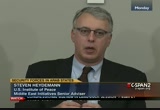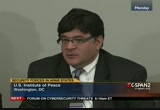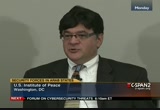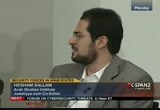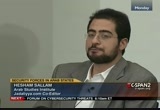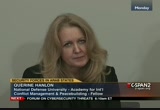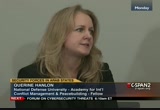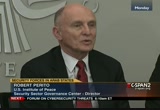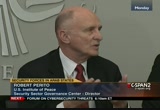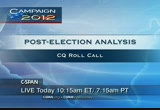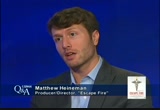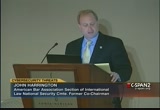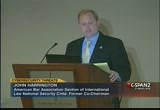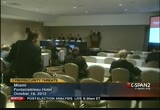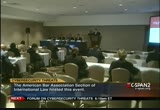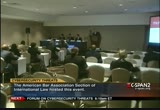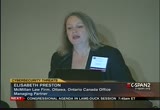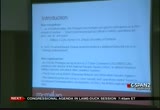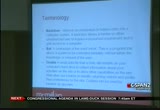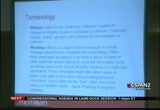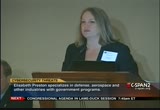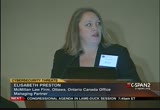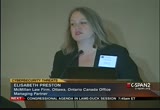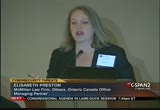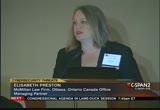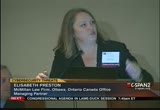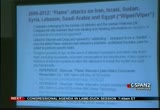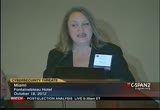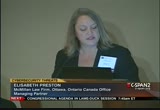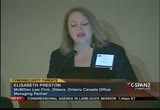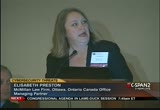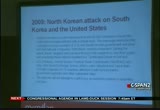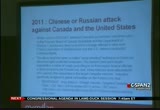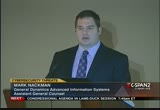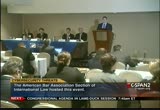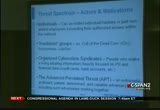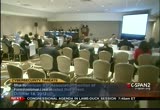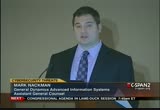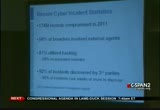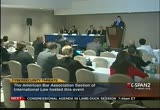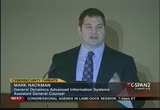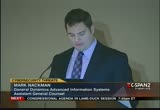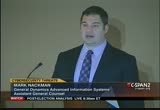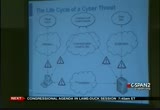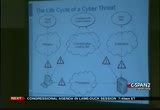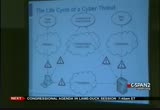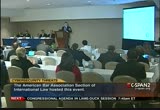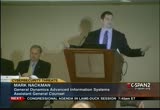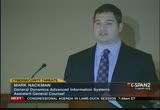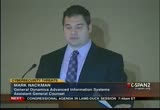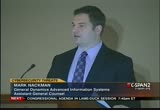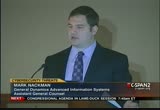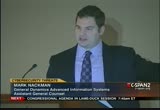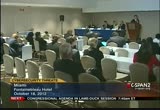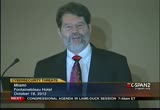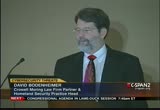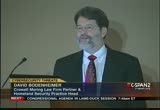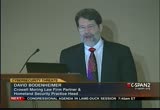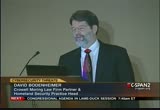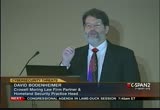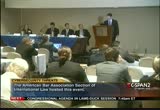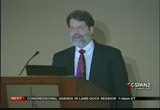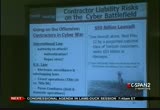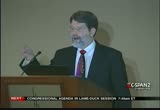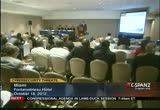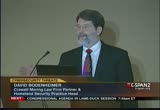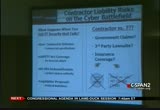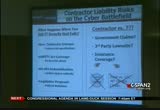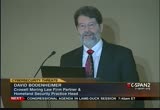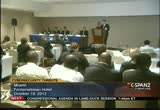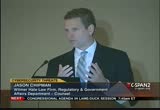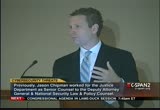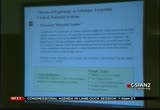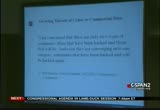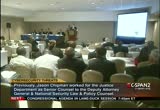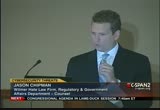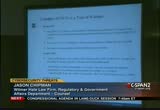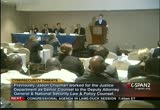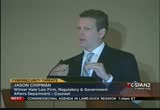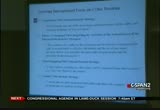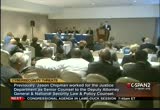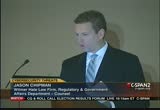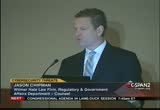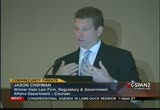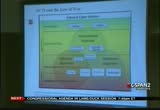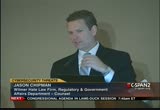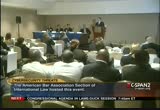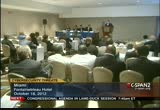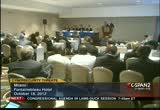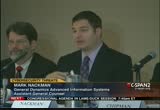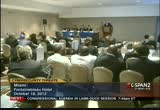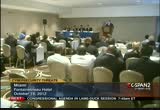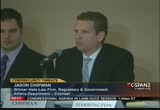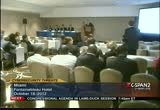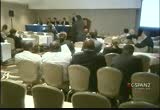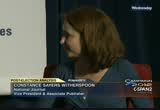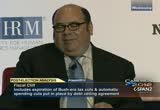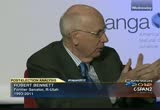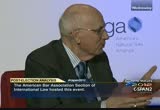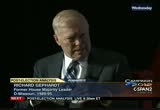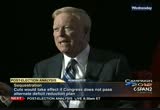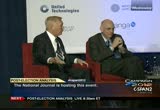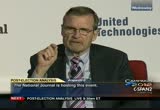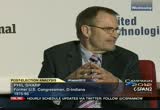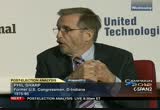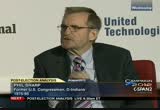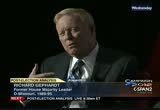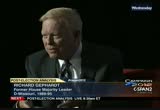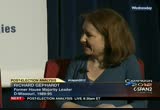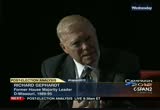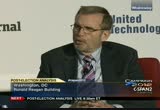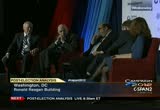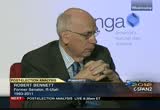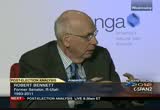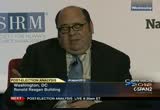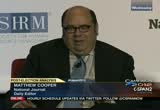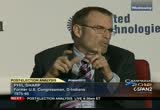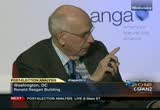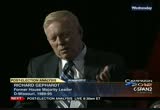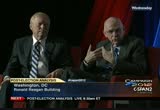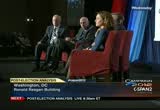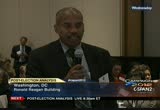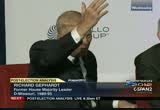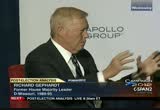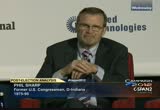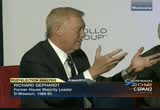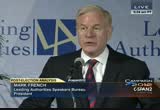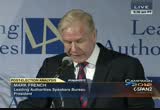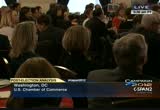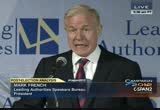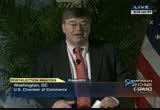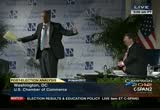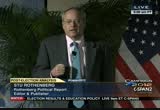tv Today in Washington CSPAN November 8, 2012 6:00am-9:00am EST
6:56 am
>> pardon the delay here. we have obviously a cyber attack. i'm david bodenheimer. i'm delighted you're here. from the aba science and technology section, and a be a public law section. i'd like to get a special thanks to john harrington for pulling this together, to william black for is working this panel, and the aba international section for putting on this terrific program, a topic that i consider to be one of the biggest, scariest topics of our time. for those of you that are familiar with this topic, you
6:57 am
may share some of my sentiments. i'm reluctant to say this on the public record, but quite frankly i'm terrified. and i trust at the end of this you will be as well. the first time that a realize that cyberwar and terrorism was a hot topic was when the national research council put out to scholarly publications on cyberwar, while at the same time "vanity fair" had cyberwar on the front page along with our best friends the british royals, kate and we'll. that tells you we're covering both ends of the spectrum. as we know, the director of national intelligence, mike mcconnell, famously said, we would lose a cyberwar if it took place. i think the canadians would win but i'm not so sure about the americans. this thing is like an obvious
6:58 am
question. is cyberwar and terrorism bad? well, and we have mr. carney in the audience? do any of you agree with mr. carney that there is no substantive basis for the cybersecurity threat lacks no takers? that's too bad. i was hoping that somebody they gone for today. mr. carney and apparently hadn't talked to the president. the president said that cybersecurity is one of our most serious national security threats. it's not a theoretical. it has already been levied against certain cities to block them out. it has already been used, as my co-panelist mentioned, as a prelude, the shock troops before the russians invaded estonia and georgia. this is a bipartisan issue. you have senator lieberman
6:59 am
saying its cyberwar and the cyberthreat is a clear and present danger. the same with senator collins. senator barbara, you can go down the list. they will all tell you they, too, are scared about the threat. mike mcconnell before his director of national intelligence warned that if instead of laying aircraft into buildings in new york -- flying aircraft into buildings in new york, the terrorists had directed a cyber attack at the largest banks in new york, the economic impact would have been 10 times worse than 9/11 actually was. this is not a theoretical threat. those of you who have had trouble accessing your banks, senator lieberman has pointed to the iranians as retaliating against the u.s. banks for the stuxnet attack that i will talk about momentarily.
7:00 am
and our power grid. what is the risk? well, one is that terrorists want to break into our power grid. those of you that have lived a few days without power, as mark and i did in d.c. when a few trees knocked down our power lines, well, there are already, according to a number of the experts, foreign nation states that are in our networks, in the power system. the operation aurora, a few years ago, proved that a cyber attack can bring down the power grid with a cyber attack on one of the systems causing it to literally shake itself to death. and if you've noticed, you can't go to wal-mart and pull these power systems off the shelves. it takes a few months to get them back. a few months without the systems could be a $700 billion impact.
7:01 am
the intelligence community in the u.s., they are afraid, too. they warned that already they should -- nation states are in our power grid. as you've already heard from john harrington, for the first time that i recall a sitting u.s. secretary of defense has warned of a digital pearl harbor, meaning bringing down the power grid, bringing down the water systems, bringing down air traffic control. essentially paralyzing the country without sending a single airplane or ship into u.s. territory. people say, like mr. carney might, this is all science fiction. it's not really going to happen, not true. well, if you look at the stuxnet virus, which elisabeth talked
7:02 am
about in her discussion, that was one of the single most technologically advanced viruses ever found at the time. it took months to prepare, millions of dollars. there were only five countries on the face of the earth that have to take knowledge and capability to put that together, and it brought down 100 centrifuges in iran, which i'm pleased about. but that particular virus exploited zero day vulnerabilities, meaning vulnerabilities -- nobody even knew we were in the software and also require the death of a digital certificate which is the equivalent of breaking into fort knox to get one of those. the senate homeland security committee also had testimony. a cyber attack on a pipeline caused it to spin up and explode with the force of about one-fifth the size of a humor
7:03 am
shima bomb -- hiroshima bomb. china has identified cyber dominance as a national policy by 2050. my protection, i think they are ahead of schedule. i want to shift now to talk on a different topic, which is contractors and the private sector, what cyberwar means in that arena. america does not go to war without contractors anymore. as we know, they have been on the battlefront in the kinetic warfare business. well, i can assure you in the cyberwar business, it's going to be doubly true. and for the private sector and the contractors that are on the battlefront, they are going to be caught in the crossfire of the cyberwar. i want to describe some of the risks that companies need to be
7:04 am
aware of as they get into the mix of a cyber operations and what it means for the company. there's several reasons it's going to happen. one, there's not enough expertise in the world of cyberwar and terrorism and cybersecurity to handle the work. there's not enough in government. there's not enough in private sector. you're going to have both in public-private partnerships that are involved in putting together offenses and defenses strategies on a cyber battlefield. as the public safety minister for candidate said, we are already in a global arms race. and that's going to pull the private sector in, and for many of you that are in the private sector or advising the private sector, your clients are going to want to be in that business. it is one of the few areas in
7:05 am
the times of fiscal austerity, in the budget crunch that you can actually find the money and spending going up. so they are going to be there. international law on the battlefield, jason chipman is going to discuss that in more detail. in many ways we are on the frontier of this law. the law is old but when you try to apply it to cyber weapons and cyberattacks and what is an actual attack, if you have a denial-of-service attack on a particular business, a bank, is that within the meaning of the international treaties and conventions? we're going to be testing that. we will find out in the future. right now, the president is somewhat uncertain as to what it all means. there are three scenarios for
7:06 am
the private sector, and contractors, where there are risks. one is assisting on offensive operations. essentially developing the stuxnet virus, cyber missiles and other ways to attack. what does that mean for international law? what is the authority to attack? generally you have to be attacked before you can then counterattacked. they can be a reprisal, but what is the protection for a government that does it? what are the rules? somewhat unclear. it's even more unclear for contractors that are assisting in developing the cyber weapons, particularly as they go awry. what about authentication? as elisabeth mentioned, botnet. many times the contractor, the
7:07 am
agency or others are going to be trying to trace back who attacked us. who brought the cyber attack down on our networks. well, what we have found, have clients that have noticed that the cyberattacks on their systems are coming through the local community college there in virginia. who is going to take down the community college network? well obviously they're not the ones doing the attack. the real attack is coming from another country. so first come you trace it into that network, in the community college. does not violate the computer fraud and abuse act within the u.s.? and then you trace that attack over to germany. well, that's another front, another botnet, and you keep going. does that tracing and authentication into the european community violate the convention for cybercrime?
7:08 am
steel a know. we will find out. within the u.s., the electronic surveillance law, you know, what are the rules for authenticati authentication, identifying this attack and then turning around to attack the attacker. well, within the u.s. there's some uncertainty about what, who does what and who has responsibility for different parts of a cyber attack. those in the business call it part 10 versus part 50. what does that mean? part 10 is the u.s. department of defense. that's its authority, but it has limited authority to operate in the u.s., whereas the intelligence communities are not supposed to be operating in the u.s. what does this mean for contractors? one example is verizon. verizon was helping nsa. in the course of trying to track
7:09 am
the traffic come through the lines and providing the assistance. what happened? verizon was sued, $50 billion. for the telecoms, they got the assistance of congress with some indemnification, statutory protection. that doesn't exist, generally, for all companies, and particularly for companies in the offenses cyber operations arena. what about defense? many, many more companies are going to be involved in defending against cyber attacks, cyber terrorism. when a company feels a particular cyber defense solution, what happens when it fails? as mark discussed, the rs a
7:10 am
breach, there in the security business. they had a breach. and failed. companies that are in this business are going to be a breach, they're going to technology that this but what is their protection? well, one would be the government contractor defense. except for the fact that it only applies under limited circumstances. for example, when the government specifies the requirements for the system, such as a detailed level three drawing package for a helicopter. generally you're not going to have that for cyber defense. safety act. some of you may be familiar with the safety act which provides liability limitations for homeland security contractors that are developing, antiterrorism technology. that would be a great solution except it has limited applicability. it does not apply except through acts of terrorism. so if a nationstate makes the
7:11 am
attack, you don't know what the health coverage. or alternatively, if there is an attack for which you can attribute -- can't attribute who did it, then you can't tell if it's an act of terrorism. what about indemnification? there is indemnification authority under limited circumstances, but generally the department of defense hands about on a fairly limited basis. what about other scenarios? can the government make a complaint against a contractor? perhaps he can. what about third party liability suits like the verizon $50 billion suit? limited protection there. insurance coverage, it does exist, but it has some severe
7:12 am
limitations, as mark discussed in his presentation. finally, what about the private sector standing on the sidelines? that the risk area, too. there will be times -- excuse me, there will be times there will be a botnet attack and he'll be coming from your system. somebody has taken over your systems, if the government shuts those systems down, what are your options? can you bring a fifth amendment claim? it's unclear but if you're a contractor can you bring a suit under the contract disputes act, again unclear? the last item i will discuss, network access. for many contractors, if you cannot connect to a federal agency or your customer, that is essentially an economic death
7:13 am
sentence. but if your systems are compromised you are likely to have the plug pulled on your system. and those circumstances, what are your remedies? again, it's unclear. you know, we are truly operating in the wild west on the frontier, and many of these legal issues will be determined in the next few years. and many of you may be in the middle of determining them. thank you. >> thank you, david. well, moving on to potential responses and what the law states in terms of our response to that, we have jason chipman who will be our last speaker. we're going to follow this up with questions and answers. >> thank you very much, and thank you, john harrington and all of the other panelists here.
7:14 am
so, i do want to leave some time for questions, some going to try to just offer a few observations about this topic, how we talk about cyber warfare and cyberattacks that maybe break out those concepts a bit. talk a little bit about the international legal framework that's relevant here and offer up a few soft and observations that might generate some discussion relative to our domestic laws in this area. so one thing that is interesting to me is the press accounts usually, often use the word cyber attack. there's been a cyber attack on a company or on a business or some institution. and that's fine but they often mean different things. so sometimes they mean there's been an infiltration into a
7:15 am
network for criminal purposes. there's been some criminal offense. sometimes they mean there's been some sort of espionage activity. that also is likely a criminal event. we've seen less of, though as you've heard, seen perhaps more cyberattacks that are maybe something like an armed attack under the u.n. charter. conceivably i suppose even an act of war, though that is a debatable point as to whether we've seen anything like that to date. i have put a few terms of the things that are really. computer network attack, as we've been talking up, computer network exploitation is basically efforts to infiltrate a computer network for any other purpose i just described. so maybe some sort of armed attack. maybe it's for criminal activities and you're hoping to
7:16 am
be surreptitious about what you can. maybe it's her espionage and then you're hoping to be surreptitious. cite a few examples of how these concepts and relate to one another. and how come if you are in the business of computer network defense, you are trying to defend networks at your company but if you're looking at this from a policy perspective for the united states, for example, how vulnerable is the united states, how vulnerable is our critical infrastructure and nuclear power plants, things like that. you quickly see that an infiltration into the network might be to steal somebody's social security number. it might be for espionage purposes, could be to harbinger something more serious and attacking that destruction. i have a few examples to illustrate some of these points. this one is particularly striking. a few years ago the deputy
7:17 am
secretary of defense at the time published an article in foreign affairs where he described what really, if you step back from it, is i think a rather extraordinary event. he described that in 2008, a defense department computer network had been, was compromised by malicious code on a flash drive, some drive presumably, and that the flash drive code come he said, was placed there by a foreign intelligence agency, that it had uploaded itself onto the u.s. central command network. and that the curb spread undetected at both classified and unclassified systems. but one of the most striking things about that statement is he said this is u.s. classified networks. and he said this establish the digital beachhead from which
7:18 am
data could be transferred to servers under one control. and this is a u.s. department of defense, having both, he's describing classified and unclassified computer networks infiltrated, presumably for some sort of espionage purpose, but perhaps for something more. and that's one of the real concerns here is that these sort of infiltrations that we see come at the other panelists have talked about, you could imagine being harbingers of something more destructive or something more problematic. i think one of the other panelists mentioned this quote from fbi director, and you see the same concerns of talking about in the commercial sphere, to. he said basically set to every company is being hacked one way or another and it's not a question of when they will be hacked. it will be a question of when it will happen again.
7:19 am
that might be a pessimistic view of how bitter cybersecurity sector can be. it is certainly a theme you see in the space. my only point, the only other point i want to make on commercial data is that you see and report. there was a report issued by verizon about data breach investigation, that suggests that a lease in endears large numbers of serious cyber intrusions intrusions have been aimed at create taking authentication credential, passwords, usernames, things like that. things that can be used for later inclusion's in the future, things that might give an intruder broader access to a network. so i'd like to shift for a moment, those ideas in mind, and
7:20 am
talk about offense of cyber operations. and what do we mean by that and what is, what might be the relevant law to this compounded by the way to think about this from a legal perspective. so we think of offense of cyber operations networks to degrade a computer network, to make somebody not trust the computer network, i think we do think that as -- [inaudible]. and within that category we could also think of computer network attack defensive response. so namely, your systems under attack somehow, your systems being infiltrated, and perhaps you have the capacity to respond back. so this would be a retaliatory strike of some nature. so with that in mind, i thought
7:21 am
we could talk about ways in which some of the other panelists touched on this, ways in which these offenses tools can be used as instruments of warfare. and i think from my point of view, and others have said this, too, i suspect it's inevitable that future major military conflicts, think of future land wars, will have a cyber component one way or another. it seems very likely that in the future that these tools will be used by foreign militaries, perhaps our own military, towards whatever military objective, whatever it ends are at stake in the conflict. and i think just from press accounts there's some reason to think we've already seen early examples of that. some of the other panelists touched on the events in a stone
7:22 am
in 2007 during a dispute with russia -- estonia, and various banks and government institutions in estonia were hit with denial of service attacks. just to say, attacks that kept those institutions from at least running on the internet, capped their websites working, maybe disrupted their operations one way or another the interestingly in response to the estonia events, nato established a cybersecurity center of excellence in estonia in 2008, and they've been studying this from nader's perspective from a law of war perspective since then. recently published a very comprehensive treatise on the subject of law of war and cyber warfare. you see the same thing in georgia. press accounts suggesting that the russian government was behind cyberattacks that
7:23 am
occurred contemporaneously prior to land forces going into georgia in 2008. and there are other examples like this, and is one of the panelists mentioned, as john mentioned in his introduction, even secretary panetta recently gave a speech, and according to press accounts officials at dod have suggested that iran has been behind a number of cyber attacks in the middle east in recent months. so i think with that in mind, you see an international response of countries and organizations like nato, the u.n., former soviet bloc countries, there's a group called the shanghai group from china, all trying to struggle a bit with how to think about how to use cyber weapons and how to
7:24 am
use cyber warfare capabilities in the future, and how those ideas, what happens with those ideas when they hit our international legal norms that we can use to over the past number of decades. the u.n. charter, what prompts a defense of a nation state. you see here, and there are lots of examples like this to the u.s. 2010 national security strategy describing particular serious. the russians have also come up with their own statements about when force can be used in cyberspace. you see this in the uk, canada. most major militaries, especially western countries, are articulating strategies
7:25 am
about what does it mean to use offensive cyber weapons, we would reduce offense of cyber weapons and what would be the norms associated with that topic. now, i think when you start talking about the law, it's easy to imagine that we're talking about something very new. and i usually debate this idea, though you hear it a lot but you here sometimes people analogize cyberspace to outer space, the high seas or very new areas, perhaps even lawless areas where there are no legal frameworks that apply. i don't, i think that's in general a mistake, although no doubt that are very complex issues and very new issues that countries are facing because of offense and cyber activities. i think the legal frameworks we have, in general, can be brought to bear to those new problems,
7:26 am
and updated and changed as needed. there's an interesting quote from a book that just came out, it's quite good, called a journey to the center of the internet, and the author writes that for all the talk of place this mess of our new digital age, the networks of the internet are fixed in real physical places, as any railroad or telephone system ever once. which is no doubt true. servers are in some country, and if you invaded computer server in that country, you are probably violating the laws of that country. cable lines connecting computers and servers traverse different nations. they might go under the sea. we also have laws of the sea that address those sorts of issues. the u.s. position on this topic has been that there's no need to think of new norms. we don't need to reinvent
7:27 am
customary international law in this area. and i think if you -- so you can take some easy examples of what that means. what is the use of force in cyberspace? there's a lot of discussion about that topic right now. well, some examples are quite easy. and they are largely fact-based. so is there an intrusion into some computer network or some system that causes a fiscal effect that it had occurred -- physical effect, you would say that was a use of force for international law purposes, use of force under the human charter. maybe even an armed attack, so you gaza nuclear power plant to meltdown and wreak havoc. that seems like it's probably fairly easy to say that's a use of force. you cause a damn to open and fund our region.
7:28 am
that, too, is probably a use of force. but what can you do in response? and i think you're the basic legal international norm is probably generally apply. so concepts of proportionality, concepts of distinction. you have to, in a response you have to distinguish between civilian and military forces. you have to have a proportional response. the u.s., harold koh, that legal advice and the state department recently gave a talk, and he said for many years the u.s. has taken the position that it does not distinguish between a use of force and an armed attack against the united states in terms of triggering the u.s. is right to respond. but the response has to be proportional. so that, which is just to say that any use of force under the u.n. charter against the united
7:29 am
states under this administration's view would trigger a right to respond. and he was very clear. he said that's a right to respond with a cyber attack in response, or with military forces. it's their right to respond as a nation state to make a military response with whatever tools are appropriate. i'm conscious of the times i'm just going to do this quickly. this is a chart published by two authors, published by the guilford center at harvard. it's very interesting. and they've attempted to capture the ways in which these ideas of different objectives use of force of cyber attack, different effects of a computer intrusion might trigger different responses. and so you can see here in the chart there are differences
7:30 am
between offensive objectives, defense of the objectives, informational objectives in which is to say perhaps espionage, criminal activities. but these things can interrelate in very complex ways. so finally because i want to leave a few minutes for questions, i think, i just want to make one observation about domestic law in this area. so, the u.s. has obviously been speaking a lot about military activity in cyberspace. congress and the defense authorization act and 2011 said quite clearly it is congress does you that the department of defense, the president may conduct offensive operations in cyberspace. consistent with international legal norms. although i think international
7:31 am
law generally applies in cyberspace, i agree with this, that doesn't need to be reinvented. i do wonder about our domestic laws, and our domestic policies in cyberspace. and so if indeed, especially when we think about very offense if, kind of a major attack against the united states, let's say, and if indeed we believe that there's a serious, major foreign nationstate attack in the u.s. through cyber means, or even a terrorist organization making such an attack, i do wonder whether we are positioned to respond to that the same way we are -- by way of example that i think about sometimes, if you envision some sort of horrible event or military invades the
7:32 am
united states, we might not all know the exact rules of what happens in response, but i think most of us are fairly confident that the military response, jets are scrambled, people basically no who is supposed to do what. although there might be a great deal of confusion on the ground about what's happening. the basic framework exists for a response. i'm not particularly confident that that framework exists in the cyber realm, that is there some major attack into our cyber infrastructure, critical infrastructure, it's not clear to me that we know who is responding, how they are responding, how they're getting access to the fairest networks that they need to respond. and i think you'll start to see more and more discussion on that topic in the future. thank you. >> we have a couple minutes here. >> we have a few minutes for questions, so it's a very
7:33 am
7:34 am
[inaudible] >> who would like -- >> i think, i don't know if it's in the spirit of world war ii, or rises to the stage at that level, but there is a group, referred to as the defense industrial base that did some of the largest defense contractors that of all signed a memorandum of agreement with the government, and they shared threat data together, and then through the u.s. department of
7:35 am
defense, defense cyber crime center, that data is analyzed, forensics are performed on it, and information is shared back with a d.i.b. members on how to improve defenses. so there is, that is i think, that's been pointed to as an example. that could be expanded broader than just the companies that are in effect are simply need rules, and i was kind of spirit behind it. the bill died in the senate, of expanding that. so that is an example of an industry, government sharing of information. i would say it doesn't rising what to the level of, you know, people aren't making posters, work together and selling war bonds like world war ii though. >> before the next question, we are at the hour and a half point that i did want to make an announcement before we lose our feed here, that we have our next national security program is at the d.c. meeting, and wednesday
7:36 am
april 24 at 11. responsibility to protect from diplomacy to action. and that's according to years into the arab spring, what's our responsibility to protect civilians, vis-à-vis libya and syria. okay, next question. [inaudible] >> i would think the dod has already got to be mapping this out. [inaudible] >> well, i think, i guess from
7:37 am
my point of view there are a lot of issues out there in the terrorism of space, and in the kind of military traditional warfare space, that are no doubt very complex policy issues. even your example right now, i don't disagree that there are all sorts of very complex threats out there, and you see this with secretary panetta's recent statement about computer attacks on banks and whatnot. and computer attacks in the middle east, recent articles about this. but even those examples, it's not clear to me what the international legal deficiency is. it's not to say that there is no need for changes or no need for, there aren't hard questions after. i think there are, but i suspect that most of the hard questions, the same sort of hard questions
7:38 am
we have to muddle through in the physical space. like if there's an attack on the u.s., a physical attack on it might take some time to figure out who did it, and what are we going to do in response, was proportional? what are the tools that are available? but i take your point. these are indeed complex issues. spent i saw a hand over here. [inaudible] >> sort of analogous to when they shut down the airlines for two weeks following 9/11, correct? >> it's more the idea that -- [inaudible]
7:39 am
7:40 am
electronic jihad. and in that video they discuss what you're mentioning, which is that, first off, they like and the vulnerabilities the internet, in the structures, the internet, to being like the vulnerabilities that were in the aviation security area pre-9/11. and then they say, and on top of that, of course, shutting down the capitalist, you know, american expletive, is certainly a goal in and of itself. and so that it's not, it's not merely just the attack on the network and all of that, but it's also attacks on the culture, and that the culture is perceived to be, you know, very much -- government for e-commerce but for entertainment and for other areas that are also perceived as worthy of attack. >> i will just add, i think
7:41 am
there is immense, i think of describing an immense problem, a real tension, intention there in terms of security in keeping the internet open. the state department, secretary clinton speaks frankly about and internet freedom agenda around the world and keeping the internet open in places like china and regimes that might be trying to crack down on free movement of information. and i think it's a real -- it's worthy of a serious debate i think. >> any other questions? well, i want to thank the speakers for coming, all for, far and wide to speak on this very compelling topic. and i invite further discussion on this down the road. if anybody is interested in our subject matter, please feel free to approach me, william black, or any of us. and hopefully participate in our committees to so thank you very much a plo.
7:42 am
7:43 am
information. if you buy one of these troubled pay packages, and i went in my home, you pay on average with taxes in his $160. in france uk $38 u.s., and you get worldwide calling to 70 country, not just u.s. and canada. you get a worldwide television, not just domestic, and to internet is 20 times faster uploading and 10 times faster downloading and you're paying less than 25 cents on the dollar. all these other countries understand a fundamental principle. in the 19th century, canals and railroads were the key to economic growth as an dutch election came along, and you have to move heavy things like steel. as the 20 century came along, it was highways, interstate highway program for example, and airports that were crucial to economic growth. now is the information superhighway. and what does the industries they? don't call it the.
7:44 am
>> david cay johnston on the many ways corporations try to rob you blind and saturday night at 10 eastern, and sunday night at nine on afterwords this weekend on c-span2's booktv. >> now a discussion on the congressional agenda during the upcoming lame-duck session. this panel of former members of congress was at a "national journal" forum on the results of the election. this is about 45 minutes. >> so i will launch right into there's been a huge amount of discussion last night and this morning about mandates, who has mandates, who doesn't have a mandate. but when it comes to the fiscal cliff, more important question really is who has leverage. and i'm wondering, the democrats are convinced that they have leverage because they are willing to jump off the fiscal cliff if it comes to that, and what tax rates go up to do you think that they actually do have as much leverage as they think
7:45 am
they have? >> well, that's a question to let me back at the second. it's kind of amazing, that after all of this, all the ads we sat through, that we are back with president obama, a house that has barely changed to seize and the senate that is based by the same composition. we kind of ended up right back where we started. so i think that leverage, you've got to give more edge to the president just because he got reelected. and second, the bush tax cuts are due to expire. that's the big leverage. they are going away. and if you want to keep them you've got to do something. you can't get to an agreement. they're going to go with the so i think that gives the president and its. look, i don't know how the fiscal cliff mess is going to point out. if i had to guess, i think they'll sort of used duct tape and chicken wire and kleenex to kind of get through the next 10 weeks. i hope they can get it. grand bargain between thanksgiving and christmas
7:46 am
shopping. but i don't think it's accordance the president mentioned tax reform last night. and very curious to hear what congressman gephardt has to say about that, having been so intimately involved in the 1986 reform. so i think where we're heading is, you know, kind of kicking the can down the road for a while, and then a big push for tax reform. can you get there? i don't know. i think the circumstances were tough in 1986. i think it's tougher now for a lot of reasons. the composition of congress. but i think, i think that's we are heading to i think tax form is kind of the only away to get the additional revenue without just dramatically hiking rates, which i don't think anybody is inclined to do right now. that's a long answer. i think the president has more leverage.
7:47 am
>> do you agree? >> yet. that doesn't mean it's going to happen. i have been through two lame ducks where the control changed. one after the election where the democrats won control of the senate, not by an election but by defection and the republicans won it back, and had that lame-duck. in the lame-duck where democrats came in in 2006 and that was an elective mandate rather than the other kind. in both instances, i'm speaking we let the house members talk about the house, but speaking of the senate, in both instances the senate leader, prior to the lame-duck, in one case daschle and the other case, had a whole agenda in the lame-duck. we can't get this done before the election but after the
7:48 am
election when we can work all this out. and the psychological impact of seeing control changed as a result of the lame-duck, willing both agendas. tom daschle could get anything done that he wanted to the republicans, absolutely not. and bill frist, it was frankly the house republicans who said we are wiped out, we're going to pass a continuing resolution and then go home. and he said wait a minute, we've got to do this. know, go home. so there was nothing would do about it. so the question is what is the psychology of this election going to do to the best laid plans of harry reid, and speaker boehner and the president? i don't think any of them expected what you just
7:49 am
described, which is no change. the great surprise is that there was no surprise. and i don't expect the lame-duck to do very much for a while. i think they're going to pass a continuing resolution. they do have a fiscal cliff that they have to deal with, and it will be a calibration of who gets hurt the most if we allow the economy to go over the cliff. and i think if nothing is done the economy will go over a cliff. who gets blamed lex they blame the republicans now. the democrats won the election. the voters are not always rational. the way they hand out blame. there's a lot of speculation going on right now at leadership levels in both houses and both parties, with the white house briefing a huge sigh of relief that the polls were all right,
7:50 am
but now we are stuck with this for four more years. how do we deal with this? i don't think anybody knows how the lame-duck is really going to work, other than, you know, will be a continuing resolution. will be a kick the can down the road kind of resolution. the question is how many things will be added to the train as it's moving through and what shape will it be, and that's great uncertainty. >> congressman gephardt, as senator bennet just like that, this could get pretty messy even if they come up with some solution that involves duct tape and kleenex but it could get ugly before it is resolved. and doesn't that affect the leverage here for the president? is the president, does iran want to start his second term with an economy that's already fragile and at risk of going into another recession speak as well, lame-duck sessions are always
7:51 am
lame. [laughter] and they use that word for a good reason. there's two problems. number one, there's no time. number two, everybody's either angry or elated or just exhausted. so it's hard to get people's attention, and to get the effort that you need from 535 people to come up with some big agreement. so i'm very skeptical that they can be many big deal. if i had to predict, i would say one of two outcomes are the most possible. one is to kick the can down the alley. in other words, unwind the sequestration for some short period of time, three months, two months, six months, whatever. and the same with the tax code. so that she would spend getting
7:52 am
rid -- so that you would spend getting rid of the tax cuts getting the economy moving in the right direction. the other possibility, which is harder, but may be possible, is a mini deal where you spend a certain amount of sequestration on both defense and the domestic side, and you find some revenue raisers of some kind to pay for that. and so it gets much harder because you get into all those questions of what's going to be sequestered and what's not going to be sequestered, and how do we get some revenue. but let me go to your first question. leverage and mandate. when you're talking about big fiscal issues of the kind we're talking about here, my view is that nobody has a mandate and nobody has leverage.
7:53 am
there's nothing good in any of his politically. that's what you have to understand is that from a politician's standpoint, a member of congress, in either party, at the end of the day they really don't want to vote for any of this stuff. who because it's all bad. it's all pain. it's all toxic. to cut programs or raise taxes, or even to tax reform. let's go back to 96. we get tax reform and we were purposely being revenue neutral, which means we weren't going to pick up any more revenue, but in the process of broadening the base and lowering the rate, you are taking tax breaks away from some people to give lower tax rates to everybody. that's not a happy political exercise. because the people who lost their tax breaks are angry
7:54 am
forever. they never forgive you. so there's nothing good in this year this is all bad. and so, whenever they get down to trying to do a big deal, and i hope they do for all the obvious reasons, it's going to take a hike act of patriotism on the part of republicans and democrats to get the necessary vote to get this through. because they're going to have to cut spending, cut entitlements, and raise taxes, in some way. and that will be political pain beyond your belief. and they're going to have to get members in some cases to give up their political career to vote for this thing. that they need to pass. >> congressman, opening salvos
7:55 am
from both sides indicate that each side thinks they have leverage, and john boehner said earlier this week that he sees no need to raise taxes on upper income households, and that would be bad for small businesses and show no indication of a willingness to compromise. will he need to compromise ultimately on that issue? >> well, first of all, if you think that was said prior to yesterday i think we should start with a big discount rate that anybody at any level, and most americans have discounted them totally. and that's what politicians must worry about, is massive discounting that's going on in this country of washington elected leadership and the need for people to restore themselves but and also i believe, after an election we will see an upsurge in intelligence in washington. lots of intelligent people in congress but whether they collectively pay that way is not obvious. [inaudible] >> pardon me? >> short-lived.
7:56 am
>> exactly but i think the important thing here is that, this is a more positive because i don't doubt the hurdles that are just been discussed and i doubt this will certainly be a deal, grand bargain in the lame-duck, but i think the imperative is such on the economy that will need to be some indication that this is going to be solved ask others going have to find at least a minimum of revolution -- resolution on paper that they're going to resolve it. don't forget, the good thing that happened, to set it can't avoid this decision, or at least you can't without major consequences. so if you like good military spending, you're screwed if you don't do something. and this is a good position to get the congress and the you have to get them back into a corner. and that's what they managed to do, on multiple of these issues but remember this come if we get past january 1, the truth is all of this takes in.
7:57 am
.. >> you know, now i'm in a different position. and so that gives me a little more hope that you're going to find a way through this. but the larger hope is the american people have had it up to here, and both parties and the various factions is what we really have have to take that into account. the great thing that happened with the debt ceiling thing which was awful for the economy, but the great thing that happened was the fact that every faction lost.
7:58 am
none could walk away and tell their followers, we did the right thing, america's ready to follow us. america wasn't ready to follow them then, and america wasn't ready to follow them in the fall on the basis of that vote. so some people will still be where they are but a lot of people won't, and i think the most important thing to remember about elections is we keep getting this calculation of how many democrats, how many republicans. elections don't only change the people that are in office, but they also change the minds of people who get reelected. doesn't mean they flip-flop and become something new and different, but i'll bet you a lot of those freshmen republicans will behave differently. i came in as a freshman democrat, and we were sure we could conquer washington and reform it and everything else, and pretty soon we were part of the problem. [laughter] but the point being that everybody learns in this process. and as i learned from my southern colleagues, a good expression is certain issues now
7:59 am
come into that rubric that dog won't hunt. and so certain issues are going to go off the table. oh, they'll be rhetorically still there, and can they'll feed the beast on that thing, but the republican congress is not going to have 40 votes on taking money away from, you know, not the right to life organization, the opposite, you know, kind of thing. that's just not going to happen the same way. >> congressman gephardt, you have to imagine that there's been a lot of soul searching at the white house about how to approach this differently from how the white house approached the debt limit standoff in 2011. what do you think they will do differently, and what do you think they need to do differently? >> well, i hope they will engage more members over a longer
8:00 am
period of time. so i need to give you an anecdote to kind of explain this. when george bush i wanted to have a budget summit in 1990, he kept calling the leaders from congress down and saying we need to have a summit. and we agreed, we need to have a summit. we said, is everything on the table, and he said everything but taxes. i gave a speech in houston when i got nominated. i said, read my lips, no new taxes. we can't do taxes. so we said, well, then we're not coming. everything's got to be on the table. this went on three or four meetings. finally he said, yes, we're going to put taxes on the table, i get the joke. and so he had a press release tomorrow in fits water, and we walked out of the white house, and he was standing next to me, we were waiting for the cars to come up, and he was going foot to foot, he was really nervous. i said, mr. president, what's
8:01 am
wrong? he said, the fat's in the fire. he knew the political risk he was taking. leadership is taking on your own side, not the other side. and that's what he was doing by doing that. now, i don't think he lost the election, but who knows? but that's leadership. so then we went from that to about six months of negotiating not just with the leaders in the white house, but with about 120 members. we got all the committee chairs, all the ranking members. and what you have to understand is that, you know, anybody can say we're going to cut medicare by x. the question is not what you're going to cut it by, the question is how are you going to change the program to get the savings. and so you need the committees which do the work in congress to really get down to the brass
8:02 am
tacks of what does it mean to cut x program by y. and so we went think all of that -- we went through all of that. and we still didn't have an agreement. and so we -- i said to tom foley and george mitchell, we have got to get people off campus because the press is coming up and saying, senator bennett, we hear you're cutting medicare, are you going to vote to cut medicare? and, of course, we never want to say that. so we took him to andrews air force base for a week, day and night, had 120 members had the whole cbo group, the omb group, the white house staff, and we went over all of these things and finally cobbled together an agreement. i had to eat a hot fudge sundae every night with bob dole. i mean, that's how far this went. [laughter] >> what a sacrifice.
8:03 am
>> and we came out on the floor, and we argued it for a week on the floor, and we lost. we lost. that's how hard this is to do. and so then we tweaked it a little left so we could pick up a few more democratic votes, and we finally got it passed. that was a minor amount of money compared to what they need to do now. i mean, it was like child's play. so i guess my advice to any white house, any leadership is you gotta deal with 535 people. you can't make a deal with the four leaders. they've got four votes. you need a lot more votes. you need 218 in the house, and you need probably 51 or 60 in the senate. >> 60. >> so you've got to include all of those members in the intellectual process of what it
8:04 am
actually means to do what you're doing. so that they take ownership. and the last thing i'd say is that when you watch the deficit commission do its work, i think tom coburn is a good example. probably when he started that process, he wasn't for a lot of things. but by the end of it, he became a real advocate for doing this for the good of the country. >> that's right. >> and that's where you need to bring enough people to get it done. >> well, there are a couple other pluses in there too. first of all, the white house now, obviously, has more experience. >> yes. >> with jack lew as head of omb, this is somebody who is trusted and knowledgeable and very capable. that doesn't get you the deal, but you've got to have in place that kind of staffing and other things in order to even have a chance at this. the second thing to remember is now simpson-bowles and
8:05 am
rivlin-domenici, i think, have legs in the sense not that congress is about to adopt those proposals, but in the fact that they've shown a path forward, they've been widely discussed in elite circles in this country. many people, including the president and others, who did not endorse, but they kept in the campaign referring to here's a path that might be work, and they were all being criticized by independent critics for not having taken that course. that has laid a foundation that i think makes it a lot -- it's never going to be easy, but it makes it a foundation on which you can build now. in a sense, you have to do that. that's part of that intellectual groundwork that dick was talking about that you take individual members through. now, everybody in congress hasn't gotten there yet, and that's going to take some work. but it gives a basis on which you can begin to build something. >> senator, but in terms of the process though congressman gephardt raised an interesting point about meeting at andrews air force way base, and during
8:06 am
the debt limit saga there was talk of bringing everybody together at camp dade, and neither the president nor john boehner were enthusiastic about the idea. and what happened instead were these one-on-one meetings between the president and john boehner, and eventually some meetings that involved cantor as well. should there be an effort at some kind of summit of some kind that brings all of the stakeholders to the table in. >> certainly there should. and whether it fits the pattern that congressman gephardt has described for '86 or a brand new one to be creative, i think the president ought to be having some long conversations with himself. as to how he does that. i hope the president has read woodward's book, "the price of politics." i teach at the hinkley institute of politics at the university of utah, and i've assigned it to my students, all of whom are blink
8:07 am
blinky-eyed idealistic, some republican, some democrat, and i wanted to give them a dose of reality of just how difficult it really is. and the woodward book, the one fella who does not come off well in the woodward book is the president of the united states. not because he is the socialist, saul olin sky type that all the republicans claim he is. i got to know him in the senate, and i never found that out about him until after rush limbaugh informed me. [laughter] he was not willing or from his experience base not capable of the kind of creative get down in the weeds, make this thing work
8:08 am
sort of work. he was still the college photographer, university of -- professor who said let's talk this through. this process doesn't work that way. and the earlier panel talked about all of the republicans only listen to fox news, and all of the democrats only listen to msnbc. he only listens to david axlerod and rahm emanuel in the beginning. i hope he has learned by virtue of this campaign, yeah, you won, and that's great. but if you're going to govern, you have got to listen to people who have credentials other than those that you conferred upon them. and you've got to give those people a place at the table. and i would even go so far as to suggest to him that in addition to the kind of thing that's been talked about here, widening the
8:09 am
base among members of congress, you ought to have some people outside of congress sitting at the table. a conservative economist, a liberal economist, whatever, leave paul krugman out because he's basically a voice for the democratic national committee. but find some people who are thoughtful who will say these are the real consequences of what happens if you don't do any, if you don't do anything. we're at the bipartisan policy center. during the last thing, we put together and the bpc put together a court report of whatd happen if the debt ceiling were not raised and then took it up on the hill and handed it out to the members of the tea party. it was not a partisan effort, but many of them looked at this and said, we had no idea. we didn't understand this.
8:10 am
and they're not going to believe the president of the united states who tells them this will be the consequence because they're going to say that's through a political prism that you're talking to me. but when, oh, my gosh, so the president of the united states, he has a convening power that no one else on the planet has. and i would say to him you've got to in the dick gephardt mode spread the number of opportunities for people to sit at the table. and i'd say, mr. president, you convene some folks and give them some credibility here beyond just those who have been elected. >> matt cooper, what lessons could president obama learn from past presidents including president clinton on how to do this, how to approach it from a strategy perspective? >> well, a good question. i think leader gephardt had a
8:11 am
good point about, you know, the model from 1990 and george bush, and senator bennett echoed that about, you know, getting people in the room. obviously, who you appointment to some of these positions -- appoint to some of these positions in a second commission makes a difference. if you had erskine bowles as trea give you a bit of a head start. you had players in those key positions who have been well respected on the other side of the aisle, i think that would probably help too. i think you also, um, you know, you have to know how to manage a crisis, and you could have a t.a.r.p. moment coming up. by that i, you know, you recall that when during the financial crisis the t.a.r.p. rescue package failed on its first go round, then the stock market continued its precipitous fall off the then-cliff. and, you know, it's possible you have something like that coming up soon. at the moment, wall street's
8:12 am
very blase about this. they sort of assume congress will work it out or at least kick the can down the road. but you want to look at how to manage a crisis as i think president george w. bush and hank paulson did well in finally getting t.a.r.p. through. >> congressman sharp, there are a lot of issues on the table here, and what all of the panellests are talking about at least during lame duck is at least a partial solution. is there a substantial risk that some of these things that get done every year -- the tax extend efforts, the amt -- those things don't get done because it's just too difficult to do all of this in such a short period of time? >> well, i think there's a high probability that they won't get done. however, in the lame duck. however, that is part of a if you set it up with the expectation that this is a high agenda item with the river of no
8:13 am
return, you have to get to this in the next 4-6 months, it is a a different proposition. nothing can ever guarantee that, but i do think that is more likely where we will be. you have to remember that this is not a cliff in the sense that in january all of this money is withdrawn from the economy instantly. it is over a year, and it's over several years that these payouts and this bringing in of dollars doesn't happen. so technically it's not a cliff. it is a decisional cliff, though it's going to have an impact on people's planning and their lives. and i don't mean to diminish it in that sense. but there is that opportunity to stretch that out. but if you don't do something about amt in the fall, you're going to have to do something about amt before people get into paying their full share of taxes unless you think you can get away politically with not, and i don't think you can. >> leader gephardt -- >> just one quick -- you're exactly right. but the debt ceiling is looming -- >> that's right.
8:14 am
>> and that is a cliff. >> right. >> and that will get us right back into the same place we were before. >> right. >> but, leader gephardt, aren't there problems, too, with trying to do this retroactively? let's say, for example, that they leave right before christmas and go home and say our differences are too great, let's punt this to the new year. and then they try to do it retroactively. by then the markets are potentially in panic, and americans are wondering whether their taxes are going to go up. aren't there huge risks to that? >> there are. there is some technical problems in, you know, extending the tax cuts three months, six months because you've got withholding tables, and a lot of things have to go on. but i think the likelihood is, as phil has well said, this thing gets kicked down the alley. i think the markets will put up with it and things will proceed. there is one risk that i think
8:15 am
is worth mentioning here that i've thought a little bit about, and i don't think it will happen, but in this case could happen. to kick the can down the alley or to get a small deal, you've got to have the acquiescence of the minority in the senate and the majority in the house. and you're going to hear, i think, some histrionics over the next couple of weeks with democrats saying let the tax cuts go away. that's, you know, we need to teach people what we really care about, and we're not going to cut these domestic programs. and you're going to have some republicans saying let's go over the cliff. let's cut all these programs. let people understand what we're facing. and i've heard some of them say
8:16 am
we gotta tear up the credit card. that's what i came here to do. we've got to cut the credit card. that's what i want to do. now, if it looks like that's happening as phil has well said, that money doesn't all get sucked out of the economy at once. but you could have a couple of really bad days on wall street. you could have the market drop by a thousand, two thousand points. that's what brought congress back to pass t.a.r.p.. it was just one bad day in the market broght -- brought 'em back to town to get t.a.r.p. done. so if that happens, and i think there's some risk that that could happen, i think the market would react badly, i think, and then we'd see what would happen. >> senator bennett, who was in the administration -- who in the administration do you think will emerge as the key players? you know, matt talked about jack lew. there's also vice president
8:17 am
biden who played a big role in ultimately resolving the debt limit standoff and secretary gater in, of course -- geithner, of course, will be around at least through the lame duck. >> i have nothing really to add on that. you've got it right. biden is the one member of the administration who understands the congress better than anybody else. and he was the go-to guy when we had the last lame duck. he called me, i was still there as one of the lamest of the ducks -- [laughter] he called me, and we discussed it and stayed in touch during the whole thing. basically, that was worked out one-on-one. biden to mcconnell. two people who know each other, trust each other, a couple of grown-ups. they got it done. and i don't see this lame duck being too much different. >> there's another member of the
8:18 am
administration who's been through all these wars, 1990 and then in the clinton administration, and that's leon panetta -- >> uh-huh. >> who is now at defense but really understands the budget deeply. >> right. >> in all parts. so could be another one to really help with this -- >> and another member of congress. that's one of the problems that i think the obama administration's had. to use a term not in a derogatory sense because it came to me from a democrat, he said the president's just a drive-by senator. he was not a real senator, he was a drive-by senator. stopped in the long enough to pick up his paycheck and then became president of the unite. president of the united states. and panetta was in the house long enough to understand the house, biden was in the senate for 36 years, and they did not have a congressional relations
8:19 am
team that had the kind of institutional memory that i think they needed. now they've been forced to get some institutional memory by all the scar tissue they've aqierd over the last little while -- acquired over the last little while. >> great. well, i'd like to go to audience questions now. >> hard to -- >> hi. thanks so much for a great presentation. donna cruz from aids united. wonder how hurricane sandy and a possible need for fema to get some emergency supplemental funding will impact on the lame duck and if you could talk a little bit about that and if the, if you think the c.r. that goes through march now will be folded into that to be finished out for the year. >> let me talk about that, because i was an appropriator. um, the appropriations process has not only broken down, it's been shut down.
8:20 am
and as a consequence, all appropriations decisions are made with respect to the c.r., and the c.r. ultimately is written in the leader's office. so those decisions will not be made in the lame duck by majorities on either side. they will be made by harry reid on the senate side and either agreed to or acquiesced in by john boehner on the house side. that's the worst way to legislate and appropriate is to put it all on the hands of one man, two men in this case. but that's the way it is. so i can't give you any guidance on that. talk to harry reid and see how he feels. talk to john boehner and see what he would agree to. but there will be no logical appropriations process with respect to those issues in the lame duck.
8:21 am
>> thanks. i was wondering who was among the first of the cabinet secretaries that will be asked to leave the administration? [laughter] >> i will defer to my democratic colleague. [laughter] i have some nominations. [laughter] >> i don't know what the plan is. usually in most administrations people kind of offer their resignation en masse and let the president figure out if there's any of them that they really gotta hang on to. my sense is a lot of the folks have already said they're leaving, so that probably will take place. but that's all i know. >> just to follow up on that, though, given the fiscal cliff and everything that's going on and the uncertainty, is there a
8:22 am
need to provide some clarity at least on the treasury secretary appointment sooner rather than later? >> yes. yes. >> couldn't hurt. >> that's easy. [laughter] >> how soon though? >> tomorrow. [laughter] >> the markets aren't freaking out right now. >> no, they're not. >> you have to remember the markets now understand they've got a massive discount on bah, you cannot count on washington as the general philosophy. so they're not sitting there with baited breath saying are they going -- that doesn't mean it's not serious, but it just means they're not, their expectations like most americans' are pretty darn low at the moment. >> great. >> harvey -- [inaudible] based upon your experience in congress, do you see an
8:23 am
opportunity for tax reform in the next congress in terms of lining up the ducks and getting everything in place to have something move during this very next, upcoming congress? >> well, it's a really good question. obviously, it could be part of a grand bargain because it could be the vehicle to provide some revenue as part of the overall solution. whatever ratio they're looking for in spending cuts as opposed to revenue. the worry i would have is that i said, as i said a minute ago, even when we did it in 1986 and it was revenue neutral, it was very hard to do. i mean, exceedingly hard to do. because you're taking on all the lobbies, all the interests that have gotten something in the
8:24 am
code that helps them. you know, bill bradley and i started with the first bill on this, and then ronald reagan, you know, picked it up and really carried it. and we got it done in a bipartisan way. when we did our original bill, we took out the mortgage deduction, we took out the charitable deduction, we took out everything. and we got the rates down to, you know, pristine. it was 10, 15, 25 was the top rate. and we thought it was an elegant bill, and it was. it just couldn't pass muster politically. [laughter] so we had all the real estate people and all the mortgage bankers and everybody came to town and said you get rid of the mortgage interest deduction, and it's the end of the world. so that, we lost that. and all the university presidents and all the priests and all the other charities came and said you can't get rid of that, we lost that.
8:25 am
the only thing we hung on to was state and local income tax, and how we hung on to that i'll never know. and in the end we were able to lower individual rates by taking more money from the corporate side which i don't think you can do now. i mean, everybody's saying the corporate rate's too high in america. yep. >> so to be competitive, we've got to get that down. so this is going to be a really difficult exercise. and if you're combining it with cutting entitlements and defense and other domestic programs to get the budget passed or not -- even if it's over a ten-year period, which it probably needs to be -- i just think it's a bridge too far. but maybe i'm wrong. i hope i am wrong. and it could be if they really get ambitious and they've got people really intellectually into this thing, it could be an important part of a grand bar
8:26 am
gain. -- bargain. >> yeah. i think one of the most important things here is whether, what is the attitude of people in washington or more importantly in the business community or elsewhere over where this economy is. you know, some people already know just in the cycle and will come all back. there's a lot of other thinking that says we're at a different place in our history on this economy, and we've got to take much more seriously the allocation of our resources and the impact of the tax code on investment and consumption in this country if we're going to have a vibrant economy. and if that argument drives things as i personally think it should, that would lead you to begin to take this much more seriously about tax reform. now, relate -- let me adjust to make the thing harder is, so i think dick is absolutely right, you're not going to just get rate deduction and get rid of all the deductions as a way to
8:27 am
pay for it. so what you might look for is another stream of income. and one series that's under discussion in some circles, we're doing a lot of analysis on it, but it's the carbon tax which you would think would not have a prayer in hell kind of proposition. but if it enabled factions in the congress and elsewhere to get other things they want as important, it might be that you could start something modestly that grows over time and in a sense kill two birds with one stone. of course, you might get killed in the process. [laughter] >> i think phil is right. what you always look for is the least worst alternative. >> that's right. >> and that, something like that may provide that. you wouldn't think that would ever see the light of day -- >> no. certainly not alone. >> no. but as part of, again, getting rid of the big problem you can include maybe some things like that. and the thing you have to
8:28 am
remember is that it -- if you're going to get a big compromise at the end of it, everybody has to be completely angry. completely angry. [laughter] and hate the deal completely. but you can get the votes for it. >> well, on that note -- [laughter] time to wrap up. >> angry? >> but i want to thank all of you. this was a very interesting discussion, and i think we're headed into a very interesting time. >> thank you. >> thank you. [applause] >> we have more coverage and analysis more of election results. political analysts charlie cook and stu rothenberg this morning will look at the election, president obama's win and what the changing demographics of the country could mean for republicans. leading authorities is hosting this event here in washington. it's taking place at the u.s. chamber of commerce. [inaudible conversations] >> the tv studio can produce live and archived programs and
8:29 am
features the latest -- [inaudible] share the organization's story through our live cast services you can expand your vision to include a geographically-diverse audience. when it comes to great video created by theaters, modern facilities and the latest technology, leading authorities has it all. learn more about how leading authorities can help meet the expectations of your audience through video managing. call 3-800-speaker. >> good morning. my name is raymond toll with the federation shop here, and on behalf of the united states chamber of commerce, welcome. this is our fourth and final association lecture series of 2012. it's a great partnership with mark french and leading authorities, and we have committed to do it again in 2013. [applause]
8:30 am
as i look out around the room, it's great to see so many old friends and some new. it's always great to have charlie and stu in house. you all know that the relationship we have with leading authorities is great, the federation shop uses leading authorities as our exclusive speaker bureau. feel free to call them at any time. and with that being said, let me bring up my partner in crime, mark french, president of leading authorities. [applause] >> well, thank you very much and good morning, everyone. for more than a decade, like clockwork, leading authorities and the chamber have collaborated on the hottest political program in washington featuring the two best analysts and handicappers of american elections, charlie cook and stu rothenberg. we're delighted that you could join us today and thank you very
8:31 am
much. we're very proud that leading authorities has worked with charlie and stu almost as long as we've been in business which is 22 years on december 1, and honestly, there's not another combination of speakers that we, that we book more or that are more requested than charlie and stu. we're also very privileged to be a integral part of this community of associations and companies which are at the intersection of politics and business. you know, we have been your source for thought leaders and business politics and the media, we've helped you design and produce events. we, as you saw from our little commercial, we produce award-winning video, and we publish the highest-profile publication serving associations which is ceo update. we're very invested in this community, and we believe in the adage that you can do well by
8:32 am
doing good. and we're joined by a number of sponsors today who have that same philosophy, and i'd just like to recognize them because this program literally would not be possible without their support. and i'd like to just start with bp and t, leading authorities bank. we've banked with them for over 30 years. they have become a key resource for the association community, and they're bigtime relationship people, and i'd like to recognize joe head. thank you, joe. [applause] you know, we all know what's happening on web and online is increasingly important to the way that we communicate. balance interactive is a leader in the web development, social media, online marketing and strategy, and they're represented today by their ceo, tracy betts. tracy? [applause]
8:33 am
bdo, a leader in accounting, tax, financial advisory and consulting services to a worldwide group of associations and companies, they're represented today by jeff shreg. jeff, thank you very much. [applause] i just got back last week from the broad moor in colorado springs, it's one of america's landmark resorts. it's one of the fabulous places for associations to do their conferences. i learned that they are making a huge investment in upgrading a facility which is already, you know, in the top 99.99 to make it even better, and i'd like to recognize the broadmore. thanks so much. [applause] the greater houston convention and visitor bureau, we're seeing a lot more associations look at houston as a destination. they've got a great transportation network,
8:34 am
exceptional facilities and amenities, and i'd like to recognize ron stypes from the greater houston convention and visitor bureau. thank you very much. ron. [applause] smart brief, the premier publisher of online newsletters for associations that are in 25 different, key industries, more than 100 major associations. they are the class act in this space and, please, join me in recognizing brian yellen. brian, thanks so much. [applause] and finally, spencer stewart, the best executive search firm in the world and a top leader in the recruiting talent for association, government and the corporate sector represented by my friend of over 30 years, leslie horton. [applause] thank you. so before we start today, let me just review the format. charlie and stu are going to come up after they have been
8:35 am
formally introduced, and they're going to speak each for 15 minutes, and then we're going to try and make this very interactive. and i hope that you'll ask lots of questions. we're going to have roving microphones, as we always do, and i'll be fielding those questions. so just, please, identify yourself when you ask the questions, and we'll try and get to as many of them as we can. i'm just going to make one comment with regard to a survey form that is, that are at your table. this is a complimentary breakfast, complimentary leading authorities and our sponsors. we ask that you do only one thing before you leave today, and that is to complete that form which'll take you less than 60 seconds. and before you leave hand it either to your leading authorities representative at your table or your host. thank you very much. and now let's start the show. let's roll the video. >> leading authorities would
8:36 am
like to thank our co-host, the u.s. chamber of commerce, and our sponsors; balance interactive, bd and t, bdo, ceo update, greater houston convention and visitor bureau, murray lai, spencer stewart and smart brief. now for the stars of today's program. >> i spent a good part of today with the two most respected political analysts in the country, charlie cook and stu rothenberg. their publications are the bibles for political reporters. >> charlie cook is a renowned authority on u.s. elections and political trends. once deemed the picasso of election analysis by "the wall street journal," cook produces some of the sharpest political handicapping in the business, serving as a one-man go-to source for americans who want to be truly informed. stu rothenberg has the rare ability to report on the political happenings in the nation with unbiased clarity and nonpartisan precision. rothenberg's unparalleled
8:37 am
expertise has earned him appearances on myriad news programs and in countless top-tier must publications. for decades this pair has been washington's most trusted and most accurate voice on all things political, whether it is the outcome of a congressional, gubernatorial or presidential election, they are the source for people who want to be in the know. now, ladies and gentlemen, please welcome charlie cook and stu rothenberg. [applause] >> you know, i look at that, and i think you know what? i really need to find maybe using chris christie's personal trainer wasn't such a great idea. [laughter] anyway, thank you all for coming, and, you know, we always ask for whom the bell tolls, it
8:38 am
tolls for thee. ray, thank you for having us back. and, you know, we always -- for stu, you know, leading authorities put our kids through school, have fed them, put clothes on and do a wonderful, wonderful job, and we always love dealing with leading authorities. and it's just a fabulous speakers' bureau. but thank you all for coming out. we've now had one night of sleep, and i think -- yeah, more or less. and i tried an experiment this morning while shaving. i decided to try to put everything that was really important, i thought, on one 3x5 card and just to kind of boil it down. so here are just some reactions and, hopefully, over a couple weeks, next couple of weeks, you know, all of our thoughts will sort of evolve, get a little more polished. to me, you sort of look through sort of somewhat sequentially this year, and you say what are
8:39 am
the important things, what happened? i think the first one you start off this year, we had an economy that wasn't supposed to reelect a president. and, yeah, i mean, not individual statistics, but generally speaking when you have up until two months before the election, you know, 43 months of 8% plus unemployment, you look at gdp, personal disposable income, household net worth, the poverty rate, all these things, this was not an election that was intended to reelect a president. and i think that's sort of how we started off the year. and then we had one party decided to require all of its candidates for the nomination to jump off an ideological cliff. and all punctuated by that february of last year fox news debate where they asked each of
8:40 am
the eight republican candidates, raise your hand if you would take a deal that for every dollar in tax increases there would be ten dollars in spending cuts, and not one hand goes up. and you know mitt romney knows better. you know jon huntsman knows better. the other six -- [laughter] but you know those two, and the fact that two rational, reasonable, highly-intelligent people concluded that to raise their hand would be to slash their throats for the nomination, that tells you manager. that really tells you something. and then the third thing that was important to me was you had a campaign that decided not to define their own candidate. and you think back to the romney campaign, they dispatched -- they won the nomination very
8:41 am
tactically, o -- they raised more money, they destroyed their opponents one by one, they sort of dismantled them. but they chose even during the nomination face to never tell anybody who mitt romney was. and then as soon as he won the nomination, i think it was april 10th when rick santorum dropped out, they decided focus, discipline, we are going to in i day or dollar spent -- any day or dollar spent talking about anything other than obama or the economy was a day or dollar wasted. their view. that's almost word for word quote from one of their top strategists. when i asked this question back in june. and so they focused just entirely up until just before the convention on banging on economy and obama when the thing about it is, yes, to a certain extent when you have an
8:42 am
incumbent president running for election, yes, it is a referendum on the incumbent. and it is a referendum in part on the economy and the state of the economy. but the thing about it is you've got to define your own candidate in a way n a positive way -- in a positive way, biographical advertising, testimonial advertising, you have to make them a real, three-dimensional, trustworthy individual, someone that, i mean, think of the boy scout oath. that's the general idea. i'm sure girl scouts have the same, something like that. that's the general thing you want to get across because that's the teflon coating you need to apply to your candidate in order to protect him from the slime that's coming. and the romney campaign just adamantly chose not to do that. and the obama campaign, giving credit where credit's due, they saw that their opponent was undefined.
8:43 am
and i remember sitting through some focus groups in may and june with undecided voters in swing states. other than that romney was a republican nominee for president or would be the republican nominee for president, rich, successful businessman, maybe one or two out of twelve might know he was a mormon. other than that they knew nothing about the guy. so the obama campaign goes in and basically takes a baseball bat and beats in six or eight swing states where they had saturation-level advertising from june on, basically beat his brains in. and in those swing states, he never recovered from that. so that even when the first debate happens and even when romney's numbers go up in all 50 states, they go up less in the swing states than they did in the other 40-something states, and that made, that made a huge, a huge difference. then you said one campaign chose
8:44 am
to have, do a fabulous job of get out the vote. i mean, both sides tried, and the romney campaign, they did a lot. but i think, you know, to me campaigns -- it's sort of evolutionary on the two sides, and you look back to 2004 and karl rove and that whole terry nelson and matt dowd and all these, they put together a fabulous, state-of-the-art campaign in 2004. republicans really got it. now, conversely on the other side howard dean really revolutionized the use of the web, and then john kerry carried it forward on sort of that aspect of it. but, boy, the bush campaign had it going. and then in 2008 where the mccain campaign had its up and then its down and then a little up and down, but the thing about it is whatever the state of the technology, the state of the art on republican presidential
8:45 am
campaign organization efforts from '04 was lost in '08. and had to get effectively rebuilt, this time by the romney campaign. but only after they were able to get the republican nomination in april which was so late in part because of super pacs that basically kept the process going much longer than it ever normally goes. i mean, you know, historically as long as stu and i have been watching this and before that, when a candidate started losing primaries, their donors closed their checkbooks. you run out of money, you drop out of the race. and now with super pacs what's happening is, you know, sheldon edelson can keep gingrich going for a month or two more and prolong the process and foster frieze can do the same thing with santorum. so that process went longer and longer. so romney had to go so much further and longer. i mean, here's a guy that's
8:46 am
probably by nature would you say 35, 40-yard line guy? >> uh-huh. >> on the right side? i mean, when we met with him when he ran for the senate in '94, that's where he was. moderate, you know, right of center but really a nonideological, kind of a problem-solving guy. he has to run so much longer and further to the right than he ever dreamed, and in part because of that super pac effort. and then you had -- i guess the final thing i would say is having the economy kind of -- and to me, i don't think we're seeing a big economic turn around. but we had the stock market moving up, we had consumer confidence that's now one measurement at an eight-year -- eight-month high, one near a five-month high. housing sector's showing signs of life. just -- but most importantly, consumer confidence up, right
8:47 am
8:48 am
but florida, virginia, you know, then it needed to go into iowa, it needed to go into nevada. then ohio would have put him over the top, and just didn't get anywhere near down that progression. and so, i mean, they're sort of a lot of things going on, but the most important thing is the republicans, i'm going to leave plenty of room, is that got to do something about their brand. it is just, basically the center, the center of the republican party is older white men. and that's not where this country is going. and when you look at african-americans, look at latinos, look at the fastest-growing group, asians, where that went 70 -- i think obama got 71, 72% of the asian vote. you know, the future doesn't
8:49 am
look like the republican party. and if i worked the republican party, and i think, they're going to have to do some real soul-searching about immigration, about social cultural issues. because this is not a party that is designed for the future. if this were a business you would say they have an inherently flawed business model for the future. and republican parties have, you know, they have for years, they need to turn it around because they're coming up with some candidates that are just awfully awfully exotic. [laughter] my wife has got me to stop using the term while ago. [laughter] by the thing about it is they've got so exotic that not only do they take themselves down, but they defined their part in a way that keeps people who ought to be able to win from winning.
8:50 am
one last comparison. think about moderate republicans, the kind of people they need to be nominating more and more. think about the moderate republicans that ran on tuesday in lieu states. and think of scott brown, think of linda, the former governor out and away. think about heather wilson in new mexico. and they couldn't win because of their party's brand. and conversely, look at moderate democrats running in very, very republican states. heidi heitkamp one. joe donnelly, he won. this is, you know, one size brand contaminates al all of the candidates, even the ones that have no culpability whatsoever in some of the exotic excesses
8:51 am
of party and one party is not having that effect. so yeah, we're going to hear a bunch of people with iqs lower than room temperature say that mitt romney lost because he wasn't conservative enough. but i think after republicans go through seven stages of grief and get, then they can get to a point where they can make some changes that they're going to need if they're going to be a party of the future. >> thanks charlie. let me at the charlie's remarks. appreciate you are here to listen to us, and we are trying to say something that is interesting and thoughtful and novel hours after the polls closed. i think charlie today. i hope i somehow come close to what he said. i really wanted to come out here, i really wanted to come out here and say, i just heard what charlie said, there is not
8:52 am
one thing i agree with. is absolutely wrong about everything. because i never say that. we always agree. and i consider commander-in-chief thing i disagreed with him but the problem is, we are in general agreement her, general in sync on what happened. you know, politics are so much about expectations. and expectations change throughout the entire cycle at various points. if i told you that we were going to election day and it was a squeaker, you would've been surprised. if i told you that before the first presidential debate when the race had opened up to five, six-foot, he would've said no. after the democratic convention, after bill clinton walked out on that stage, look at the entire audience, talk to the entire country and uttered those famous words that i think were decisive in the election, looked out and he said, even i, even i couldn't
8:53 am
have fixed the economy in four years. [laughter] in all humility and modesty when he said that -- [laughter] i think i was the decisive event. and didn't remember what happened after that whole discussion with the 47%, the romney tax returns, the romney probably too quick statement after the killing of the u.s. ambassador in libya, and it was that point, the end of september, the end of october whether both of us would've said this is probably going to be over. after that first debate. after we had that first debate and let's say it's a draw, nobody's going to bother with the second debate, the third debate and the race would be a five or six-point race and the president is going to win easily. so if right before the election would look back and you would have said well, i'm surprised we were in a close race. but if we go back even further, go back to august of last year,
8:54 am
when the economy looked to be in its worst shape and getting worse, the president's negatives were up, his job approval is down. back then we would've said how could the president giving it possibly reelected with unemployment number is like this? so when you evaluate where we are now, really your perspective changes when you think of where we were at various points but it was a strange election, right? ups and downs and twists and turns. i'd like to say it was a crazy election year where many of us, i won't throw chart into this, many of us pundits, observers, supposedly wise people have done this were just wrong, right? [inaudible] spent i said i'm not including you. [laughter] this is an election. just think about it. this is an election year where herman cain led the race for the republican nomination for 10 days. that's impossible, right? that could never happen.
8:55 am
nobody expected the conventions to be decisive. they are never decisive. they are orchestrated. they are planned. we watch them and we know that it's kind of like the oscars or the country music awards. nothing is going to happen. we have the first debate, a lot of people said the debates will matter. of course the first debate was decisive. it fundamentally redefined mitt romney. what happened was, charlie's right, the president's campaign was terrific in defining romney early on, particularly broadly, as this rich that he was out of touch, he didn't have a plan or no specifics. these artificial. the problem is in campaigns, presidential campaigns, the voters actually get to see the candidates come and in the debates, the voters feel they are seeing the real person. and romney, the way he appeared, was not the we have been defined
8:56 am
and suddenly the race changed again. so we had the strange up and down race that ended in close to a tie. 50-40. you said it was 50-49 this morning. makes sense. wouldn't be shocking. and yet, and yet if you were a republican voter, and i don't know why i think there might be a republican voter in this room -- [laughter] >> right over there. >> are right there.
113 Views
IN COLLECTIONS
CSPAN2 Television Archive
Television Archive  Television Archive News Search Service
Television Archive News Search Service 
Uploaded by TV Archive on

 Live Music Archive
Live Music Archive Librivox Free Audio
Librivox Free Audio Metropolitan Museum
Metropolitan Museum Cleveland Museum of Art
Cleveland Museum of Art Internet Arcade
Internet Arcade Console Living Room
Console Living Room Books to Borrow
Books to Borrow Open Library
Open Library TV News
TV News Understanding 9/11
Understanding 9/11